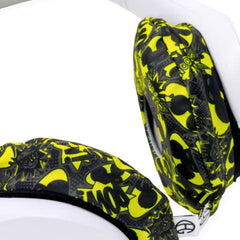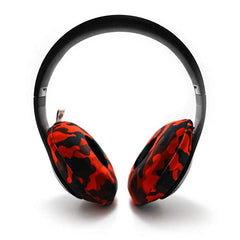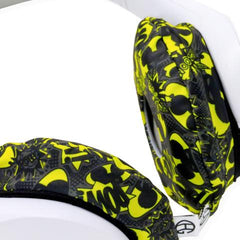Why Do I Sweat So Much When I Work Out?
Sweat is mainly made up of water but it also contains salt, urea, protein and ammonia. When we exercise and start warming up our bodies use sweat to regulate and maintain healthy core temperature.
The Healthy Living website offers this succinct and simple explanation of the process: that each bead of sweat is a liquid gaining more energy as the temperature rises. Eventually, there’s enough energy for the bead of sweat to ‘break free of the bonds that hold the liquid together and transform into water vapour’. The sweat then evaporates taking the heat with it.
Sweating during a workout can be annoying and uncomfortable, but it’s an important safeguard that helps to keep you healthy during exercise.
The body has between 2 and 4 million sweat glands, and according to the International Hyperhidrosis Association, it’s the eccrine glands that are largely responsible for regulating body temperature. These are found on the feet, the palms, the forehead, cheeks and armpits.
What Does it Mean if You Sweat a Lot During Exercise?
It’s difficult to define what sweating ‘a lot’ actually means. Everyone is different, and the amount of sweat on your skin during a workout will be dependent on a number of individual and environmental factors.
Firstly, your gender plays a role because men tend to sweat more than women. This is because testosterone ‘enhances men’s sweat response’ whilst estrogen helps keep women cooler. Men tend to have a bigger body mass than women, too, and the amount of weight a person is carrying will also influence how much someone sweats and fat is an insulator so it holds heat better.
Your family history plays a role, too. If your parents were heavy sweaters, then it’s likely that you are, too.
People who grew up in cooler or cold climates will use fewer sweat glands than someone whose childhood was spent in a warm or tropical climate.
Where you exercise will influence how much you sweat: in an air-conditioned gym or outside?
Working out outdoors means that the season and temperature will play a part, too.
We probably all look at the temperature when we watch the weather forecasts but it’s humidity that can be a real killer if you’re exercising outdoors. Humidity is when the air is already too full of moisture for the sweat to evaporate sufficiently. You’ll feel sweatier because the moisture on your skin has nowhere to go.
You may also notice an increase in sweating if you’re taking certain prescription medications.
Does Sweat Mean You’re in Better Shape?
Sweat can mean that you’re in better shape.
Research suggests that the body sweats more efficiently as fitness levels improve. You might notice that you’re sweating sooner into your workout than before because the body is improving its response. Building endurance or speed also means that you’re working harder than before and that’s going to mean more sweat. But with so many factors as to why one person might sweat more than another, it’s not always useful to use sweat volume as a gauge for how hard you’re working out or for what shape you’re in. Shape website spoke to Brett Romano Ely, M.S., who advised buying a heart monitor instead if you’re really interested in how hard you’re working out.
Will Sweat Help Me Lose Weight?
Weight loss through sweating is only temporary. It’s water weight you're losing and you’re only going to put it back on the moment you rehydrate. The Military.com website suggests that one reason people believe sweat will equate to weight loss is that boxers, wrestlers and athletes do it in order to qualify for a lower weight class.
How Can I Prevent Sweating During Exercise?
You can’t really prevent sweating during exercise but there are a few things that might help you to sweat less or to sweat less noticeably. You have a lot of sweat glands under your arms and picking a good antiperspirant deodorant will help to keep you dry during exercise. Personal choice often dictates the brand you buy but for anyone who sweats excessively, it’s worth looking for a clinical-strength deodorant that’s designed to handle a lot of sweat. What you wear during your workout is important, too. Traditionally, many people would exercise in cotton clothing but now there’s a wide range of sports performance wear made from moisture-wicking fabric. Moisture-wicking simply means that sweat can move to the outer material of the garment where it can be more easily evaporated away from the skin. It’ll keep you cooler, drier and more comfortable. You can also add sweat-resistant covers to your headphones to keep the cushions free from sweat, too.
Checking the humidity levels before you exercise can be useful, too. On very humid days it might be worth swapping to a lower-impact workout or taking it inside an airconditioned gym. If you’re overweight, then losing that excess body weight will help reduce the amount you sweat. You can also try to avoid certain triggers like spicy food and caffeine, too, both of which are known to stimulate sweating.
What’s Hyperhidrosis?
For some people, excessive sweating is a medical condition that might require treatment. Around 1% of people in the UK suffer from a condition called hyperhidrosis which is characterised by (amongst other things), a lack of sweating at night, sweating on both sides of a particular body part, sweat at least once a week and if daily activities impaired by sweating.
There’s no cure but there are treatments available that can help. Some people have found relief using specialised soaps, botox and tablets. Initially, it is worth looking into any lifestyle changes to help alleviate the condition. In extreme cases, surgery can be an option to remove sweat glands. If you’re concerned about how much you’re sweating or if it’s affecting your normal day-to-day life, then make an appointment with your GP.
How Can I Wash My Gym Clothes?
Washing a sweaty gym kit isn’t the most glamourous of chores but it’s one of the more important ones. We recently covered the subject of how to wash gym clothes you can read by following this link.
Don't forget to check out the EarHugz sweat-proof collection to keep your headphones dry during your workout. Drop us a comment below and let us know how you handle sweat during exercise.









